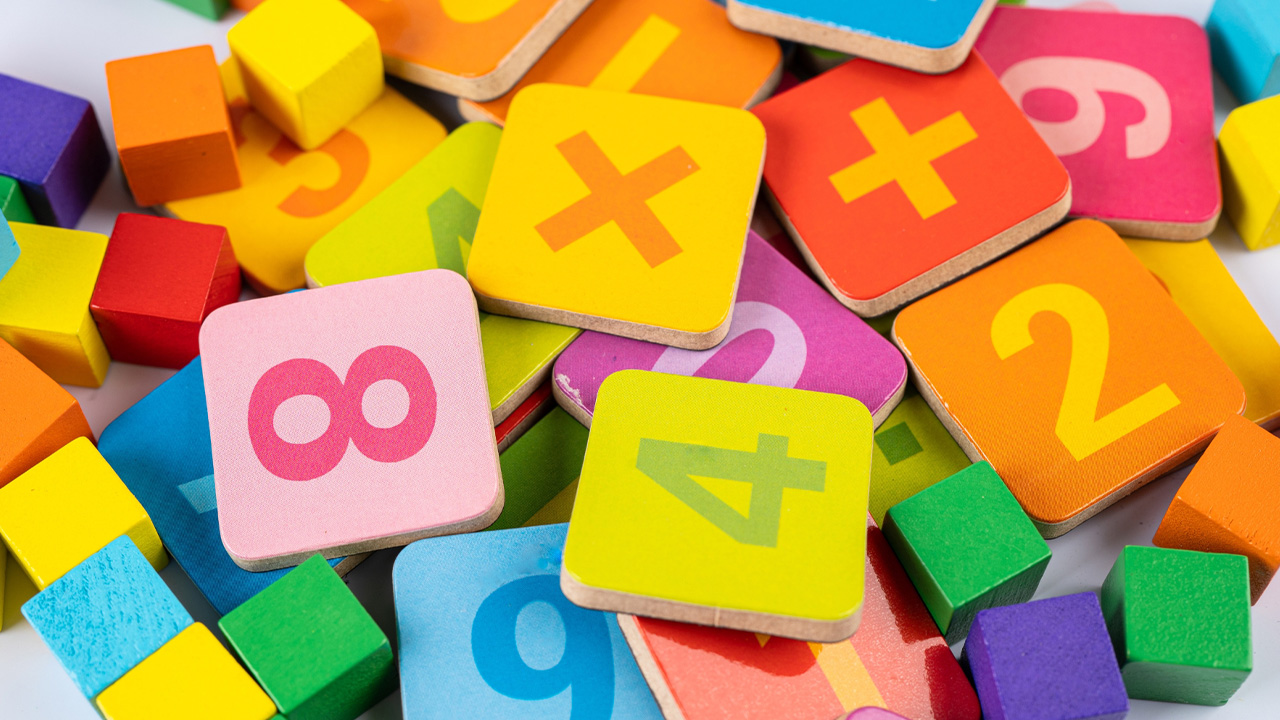
Why Your Child Struggles to Learn Math? 4 Tips to Help Children Learning Math.
When we think about Math, we immediately think about fractions, decimals, equations, percentages, and other quantitative representations of numbers, quantity, space (and even time!). It is a subject that many children struggle with, but it doesn’t have to be that way. With the right approach, your child can learn to love Math and see it as a fun and exciting subject.
Knowing why some children find Math challenging can help your child learn the subject while having fun.
Why do we need to learn Math?
Learning Math is essential because, for one, we encounter it every single day. As parents, it is essential that we make our children understand the importance of Math in our lives and why they need it in order to resolve even the most mundane problems.
For example, you need Math to stick to a budget when shopping in a supermarket. You need to create a list, identify the most essential items, and determine whether your budget is sufficient to purchase some/all of the items on the list. In this scenario, you not only use addition and subtraction, but also learn how to sort, classify, compare, and prioritize.
As such, the skills students acquire while learning and applying Math in real life will help them better understand and visualize the Math they’re learning. It allows them to hone their skills in forming connections, develop their problem-solving skills, inspire engagement and participation when a situation calls for it, and cope with the demands and challenges of the future as well.
Why are some children experiencing difficulties when learning Math?
The study of Math has several subfields. Arithmetic, algebra, geometry, trigonometry, calculus, statistics, and probability are a few of the more important ones. In school, students study a variety of mathematical subjects.
Basic arithmetic—adding, subtracting, multiplying, and dividing—is one of the first concepts they learn. And yet many find it very challenging to understand these concepts. So why does this happen to some?
Let’s understand why some students have difficulty learning Math.

Some lack the basics and understanding of Math.
The foundation for learning Math is provided by knowing and understanding the fundamental principles of Math, which include addition, subtraction, multiplication, and division. Children need to have a solid foundation in the fundamental principles of Math to comprehend more complex mathematical ideas as they grow older.
Some think Math is just numbers.
Numbers, equations, computations, or algorithms can make some children bored. This is because it can be too abstract to understand and does not relate to their current everyday experience. However, Math can become more interesting for them if they are taught the concepts and themes in an exciting and engaging way.
Some have trouble remembering
Children who have difficulty understanding Math have trouble remembering all the relevant rules and equations, or even how to apply them to Math problems. Students who are visual learners would find it challenging to see numbers, symbols, and equations, and understand how to do them. However, this can be solved by teaching children how to solve problems within a known context, rather than as a series of processes to be memorized.
Some children feel anxious about learning Math.
This also known as math anxiety, children with this type of anxiety tend to feel nervous, worried, and tense when they are confronted with math problems or situations that require mathematical thinking. Math anxiety is particularly common among children, and can develop for various reasons. Some children may struggle with math concepts and find it difficult to keep up with their peers, which can lead to feelings of frustration and inadequacy. Other children may have had negative experiences with math in the past, such as being criticized or punished for mistakes, making them anxious about trying again.
In addition, children with math anxiety may have a negative mindset towards math, believing they are simply “not good at math” or that math is boring or irrelevant to their lives. These negative beliefs can further reinforce anxiety and make it harder for children to overcome their fear and positively engage with Math.
It’s important to note that math anxiety is not just a matter of feeling nervous or uncomfortable with math. It can also have real-world consequences, such as avoiding math-related activities or career paths and missing out on opportunities for academic and professional growth. Therefore, addressing math anxiety and providing support and resources for children struggling with this issue is important.
Some children have learning abilities that make it challenging to learn Math.
Dr. Daniel Ansari, a professor of developmental cognitive neuroscience at Western University in Canada, said dyscalculia is a common learning disability among children and adults. While the exact cause of dyscalculia is unknown, researchers believe it may be related to the structure and operation of the brain. Since no two children are alike, how the symptoms manifest will probably differ due to the potential involvement of numerous factors, such as one’s development, environment, genetic composition, or damage.
Tips help your child learn Math (and actually enjoy it)

Learning Math can get easier, faster, and more enjoyable. It may take more work for some students who desire to improve their Math skills, but with teamwork, you can make the dream work!
Here are some super helpful tips for you to help your child succeed in Math:
1. Make Math relatable.
To pique your child’s interest in the subject, demonstrate how it applies to everyday situations. Ask family members or acquaintances who work with numbers (e.g., cashiers, accountants) to talk to your child about their jobs the next time they come to visit. You can also discuss how Math is used in daily activities like calculating the cost of groceries and telling the time.
2. Teach them how to focus on problem-solving.
Children should focus on understanding how and why different formulas function rather than just memorizing them. Those who learn Math by memorizing facts may have trouble applying what they have learned and frequently lose motivation when they are challenged to think creatively.
So how do you teach children to focus on solving a problem? One way is to introduce number-based puzzles that emphasize problem-solving abilities over memorization. It can be simple like these riddles:
- How many 1s are there between 1 to 20?
The answer is 11 (1, 10, 11, 12, 13, 14, 15, 16, 17, 18, 19). - If three children drop 0 coins in the coinbox, how much money is in the coinbox?
The answer is 0 (3 x 0 = 0).
3. Instead of focusing on the response, place more emphasis on the process.
Ask your child first how he or she arrived at the answer. While discussing the solution, you can guide your child in discovering their own error if they made a mistake. Otherwise, if your child provided the correct answer, the discussion will help cement your child’s understanding of the math problem, and the mathematical formula used.
4. Help your child learn how to fail in order to succeed.
In both real life and academic studies, not every problem can be solved. It’s important for your child to understand the concept of failure, how to overcome it, and stay focused on achieving success. Encourage your child to recognize that the more complex the problem, the more rewarding it will be to find a solution. Additionally, reassure your child that making mistakes is a natural part of the learning process (and life), and that it’s crucial not to avoid challenging math problems out of frustration. By facing these challenges head-on, your child will build their problem-solving skills and increase their confidence for future challenges.
Discover XAA’s Approach to Math Education: Empowering Students to Learn and Love Math

As your child grows older, they begin to form attitudes toward themselves and attempt to make sense of the world. It is important that you provide your child with a learning environment that fosters pioneering spirit, intellectual curiosity and creativity. XCL American Academy (XAA) not only offers an engaging learning environment, but also provides a rigorous academic curriculum framework as well as a lot of hands-on experiential activities designed to foster character development.
XAA follows the Everyday Math program, a comprehensive mathematics curriculum developed by the University of Chicago School Mathematics Project and published by McGraw-Hill Education. The University of Chicago School is consistently ranked in the Top 10 Universities in the world. The program is designed to teach math skills and concepts to students using a hands-on, problem-solving approach that emphasizes real-world applications of Math.
Our Math curriculum is carefully designed to help build and expand your child’s mathematical proficiency and understanding:
- Key mathematical ideas are introduced through the use of meaningful examples drawn from everyday life that are concrete and make Math relevant.
- Students frequently practice fundamental computation abilities to develop procedural mastery and fast fact recall through games and verbal exercises.
- The curriculum utilizes a variety of techniques and approaches that teach students to solve problems. They promote actual competency based on different learning styles.
Our teachers provide numerous examples, promote group work on creative solutions, and set the tone for each lesson with an organized agenda and succinct conclusion to help our kids understand Math.
Primary Years Homeroom Teacher, Charlotte Defries, shares her teaching style:
“In our classes, we will present the same problem in a variety of ways and using a variety of manipulatives. By using different manipulatives and materials such as blocks, whiteboards, fingers, and dominoes on the board, both individually and as groups, students can engage with the content in different ways, providing them with multiple opportunities to grasp a concept in the method that works best for them.”
Making connections to real-world situations is another way that we at XAA assist students in learning Math. Students are given the chance to create connections between the material and their own lives by having the option to interact with arithmetic issues and information in realistic and approachable ways. Students will be able to apply their knowledge in our math sessions and to issues in the real world by making these connections.
In addition to a rigorous academic program, XAA adopts a unique character development approach to help instill characteristics like grit, teamwork, leadership and empathy, while allowing students to express themselves, pursue their aspirations and develop their creative skills. Moreover, the academic program is provided by certified educators with a wealth of experience teaching the American curriculum and assisting students both inside and outside of the classroom.
Interested to learn more about XCL American Academy, our Math programme and how teachers help students to have the right attitude to learning? Reach out to our Admissions Team today!
This website uses cookies to improve user experience. By using our website you consent to all cookies in accordance with our Privacy Policy.






